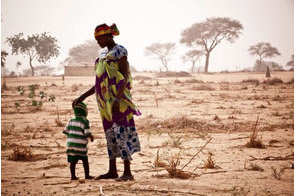On World Food Day 2020, UN calls for collective action to end hunger

Summary
Almost 690 million people went hungry in 2019, an increase of 10 million from 2018 and nearly 60 million in five years.
On the occasion of the World Food Day 2020, the United Nations on Friday highlighted the factors contributing to rising hunger, including conflict, climate change and the COVID-19 pandemic. The intergovernmental organisation and various of its agencies called for global cooperation and solidarity to help the most vulnerable populations and to build more resilient food systems.
The World Food Day is an international day celebrated every year around the world on October 16 to tackle global hunger, food insecurity and malnutrition. This year's World Food Day marks the 75th anniversary of the founding of the Food and Agriculture Organization of the UN (FAO).
The latest edition of the FAO's State of Food Security and Nutrition in the World report, published in June, estimates that almost 690 million people went hungry in 2019 – an increase of 10 million from 2018, and nearly 60 million in five years. According to the report, Africa has the second highest number of undernourished people (250 million), after Asa (381 million). Based on current trends, Africa will be home to more than half of the world's chronically hungry by 2030.
With high costs of food, a staggering three billion people or more cannot afford a healthy diet, with 57 per cent of the sub-Saharan African (SSA) and southern Asian population unable to eat healthily or nutritiously, says the report jointly produced with the World Food Programme (WFP), the World Health Organisation (WHO) and other UN bodies.
“Before COVID-19, we were already seeing a rise in hunger, after decades of having hunger on the run,” Valeria Guarnieri, WFP's deputy chief told UN News in September. “What we're seeing is that hunger is being taken to new levels. On the one hand, food prices are going go up and, at the same time, people are feeling the hit of the socio-economic crisis.”
In a statement released Friday, WFP – the world’s largest humanitarian organisation – said COVID-19 has sharply put into focus the vulnerability of the global food systems, which were already strained by conflict and climate change.
The organisation, which was the recipient of the 2020 Nobel Peace Prize last week, also released a new study today highlighting conflict as a central driver for hunger in many countries. The study, called Cost of a Plate of Food 2020, shows that seventeen of the top 20 countries where a simple meal such as rice and beans costs the most, when compared with people’s incomes, are in SSA.
“This new report exposes the destructive impact of conflict, climate change and economic crises, now compounded by COVID-19, in driving up hunger,” said David Beasley, WFP’s Executive Director.
The FAO said everyone across the global food chain has an important role to play in strengthening food systems. The agency said governments and private businesses need to accelerate and scale up actions to strengthen food systems and defeat the scourge of hunger, food insecurity and malnutrition.
FAO said governments around the world need to invest in social protection policies and programmes that ensure safe conditions and decent incomes for smallholder farmers and food chain workers, and also adopt measures that avoid economic disruptions. Other recommended government actions to support sustainable food systems include promotion of climate-smart and environmentally-friendly agricultural practices.
On World Food Day 2020, FAO said the private sector can make a difference by sharing expertise or technology with public and other private entities to help improve sustainable food production and livelihoods. In addition to this, companies can extend credit where needed to help smaller enterprises stay afloat.
The UN Global Compact (UNGC), the world’s largest corporate sustainability initiative, said with an expected global population of nine billion by 2050, “business has become a critical partner in designing and delivering effective, scalable and practical solutions for food security and sustainable agriculture.”
The WFP also said empowering rural women is a key step towards achieving zero hunger, a key target of Goal 2 of the Sustainable Development Goals (SDGs). In a message posted on its Twitter handle, WFP said reaching zero hunger depends on empowering rural women as unsung heroes of resilient communities and custodians of natural resources.
Related
-
Food security in Nigeria and the world by 2050
Through agricultural R&D investment, the population at risk of hunger can be reduced by nearly a quarter by 2030.
-
FAO says 5.3 million people need food assistance in northern Nigeria
The FAO says ongoing civil insecurity impedes market functionality and food access to vulnerable households.
-
IFPRI report examines current status of nutrition in Africa, advocates dietary reforms
The title of the report is, "Achieving a nutrition revolution for Africa: The road to healthier diets and optimal ...







